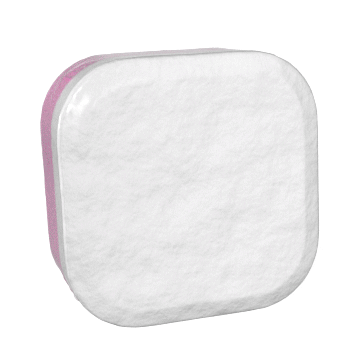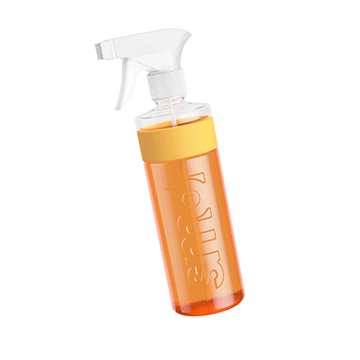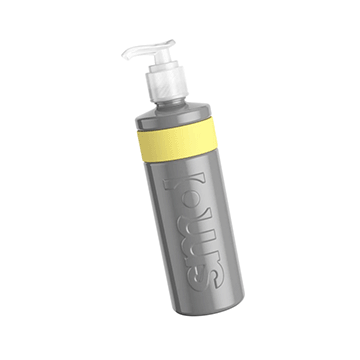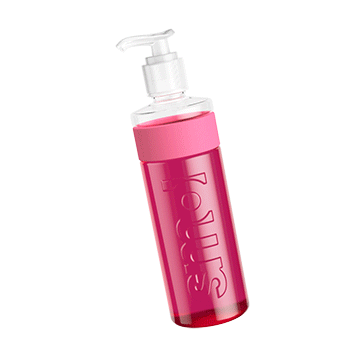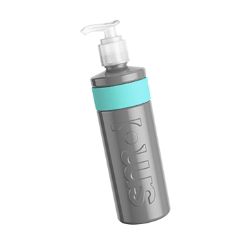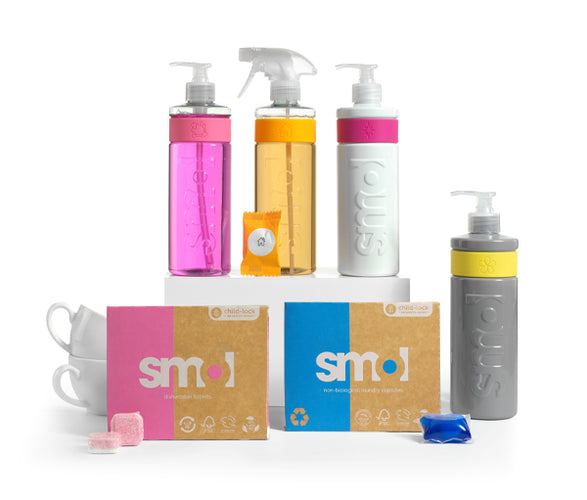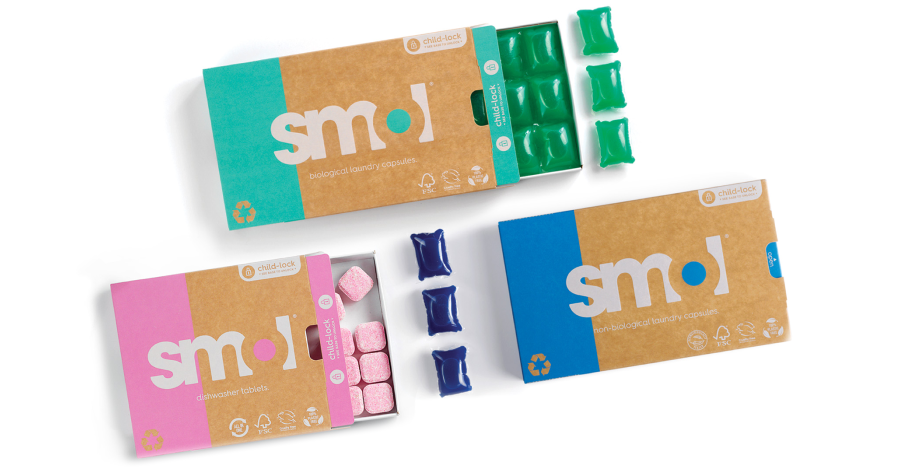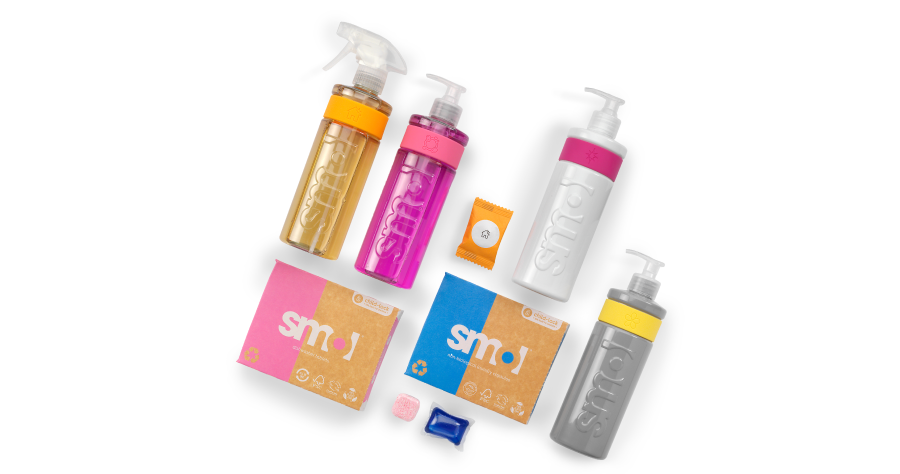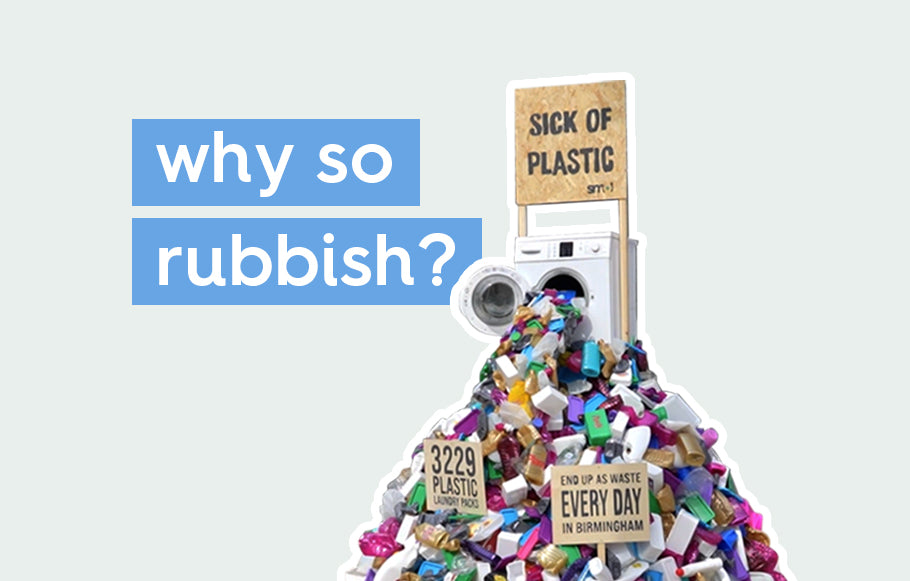
And you’ll never need to recycle another plastic cleaning bottle again.
Recycling…
…let’s start with the positives. Over 90% of UK households regularly recycle. So far so good.
And a big shout out to the fab folk of Wales… because they are successfully recycling nearly 66% of their household rubbish… nipping at the 67% of the world’s top scorer, Germany.
And then it all gets a bit… well, rubbish.
England and Scotland both trail far behind. Only 43.3% of their household rubbish is successfully being recycled.
So if 90% of us are actively recycling, but over 50% of what we throw away is still being burnt or going to landfill… are all our efforts simply going to waste?
recycling rejects.
According to the latest figures from the Local Government Authority (2020), over HALF A MILLION TONNES of the recycling we send off to be recycled gets rejected at the sorting plant.
And each one of those tonnes cost around £93 to dispose of.
That’s a total of over £48 million per year.
so what’s going wrong?
There are probably 4 main contributing factors to the overall confusion and failures of the recycling system in England and Scotland.
1. there’s no national policy.
The UK has 39 different bin collection regimes across 391 local authorities. And there’s no consistency to the rules… what is or isn’t collected for recycling differs from area to area as does how our recycling should be presented: washed or rinsed, crushed or not, lids on or off. It’s different everywhere.
And all these different rules have created LOTS of confusion in terms of what should and shouldn’t be recycled. So we’ve been making it up as we go along… or just not bothering to recycle at all.
Added to all this, the industry is mostly outsourced to private contractors. There’s just no continuity.
2. wishcycling.
Research from Wrap found 82% of UK households regularly add at least one item to their recycling collection that’s not accepted locally.
This is one of the major issues contributing to that half a million tonnes of household recycling we mentioned earlier, that’s being rejected at the point of sorting.
It seems we’re often not sure what’s plastic and what isn’t and we’re also unsure when it comes to which plastics are recyclable and which aren’t.
Check out our comprehensive guide here to learn exactly what each recycling symbol means.
3. give it a rinse.
Our recycling needs to be clean and this is a biggie.
When it’s not… we risk contaminating a whole load of recycling… including our neighbours (who might have religiously hot washed it all!). Data from recycling facilities shows that over 16% of recycling is contaminated.*
And whilst it’s true that a tiny amount of contamination might be removable by hand… if a half empty yoghurt pot has splurged its contents over piles of cardboard then it’s all been for nothing and everything will be off to the incinerator.
Of course washing our recycling does mean we’re using a little more water which might not sound that eco conscious BUT it’s definitely outweighed by the cost of a whole load of recycling having to be burnt because of food contamination.
Here’s a handy reminder how to wash and recycle our refill cartons.
4. packaging manufacturers
Lastly, it’s pretty clear packaging manufacturers aren’t doing enough to create easily recyclable packaging. Many produce and sell packs that can’t be recycled; packs that might look recyclable but aren’t - packs that we put in our recycling bins in good faith, that end up adding to that £48 million a year disposal bill.
WRAP’s UK Plastics Pact Annual Report 2019/20 shows that 36% of plastic packaging placed on the market at the time was NON-RECYCLABLE.
how to improve?
In October 2023, the UK government stated it was consulting on a national “commonsense” approach to recycling.
The message has been heard…
- recycling schemes need to be simple and easy. Anything too complicated and we’ll get it wrong or give up.
- consistency is best - with all councils collecting the same materials so householders know without question whether a piece of packaging is recycled or not by their collection.
So by 2026, word is that every household in England (for example) will have 3 or 4 bins. One for paper, glass and metal, one for non-recyclables, one for garden waste and one for food waste. All bins will be emptied weekly.
and what about the packaging industry?
From 2025, UK manufacturers will be held responsible for the cost of recycling their packaging. The more sustainable the packaging they create… the less they will have to pay.
Let’s say a plastic bottle manufacturer produces coloured plastic bottles… they will have to pay more tax because coloured plastics are harder to recycle.
And these upcoming changes are already having an impact. Pringles has spent £85 million upgrading its production lines so it can FINALLY swap to a fully recyclable tube. Good news!
Rest assured smol packaging is recyclable, refillable, compostable or all three. But our work on packaging is never complete! We’re constantly looking to innovate and find ways to bring you even more sustainable packs.
And don’t forget, if you’re fed up of recycling empty plastic cleaning bottles… try our bottle bundle. You’ll never buy another plastic cleaning bottle again!
GET OUR HOME BUNDLE*Biffa 2022

